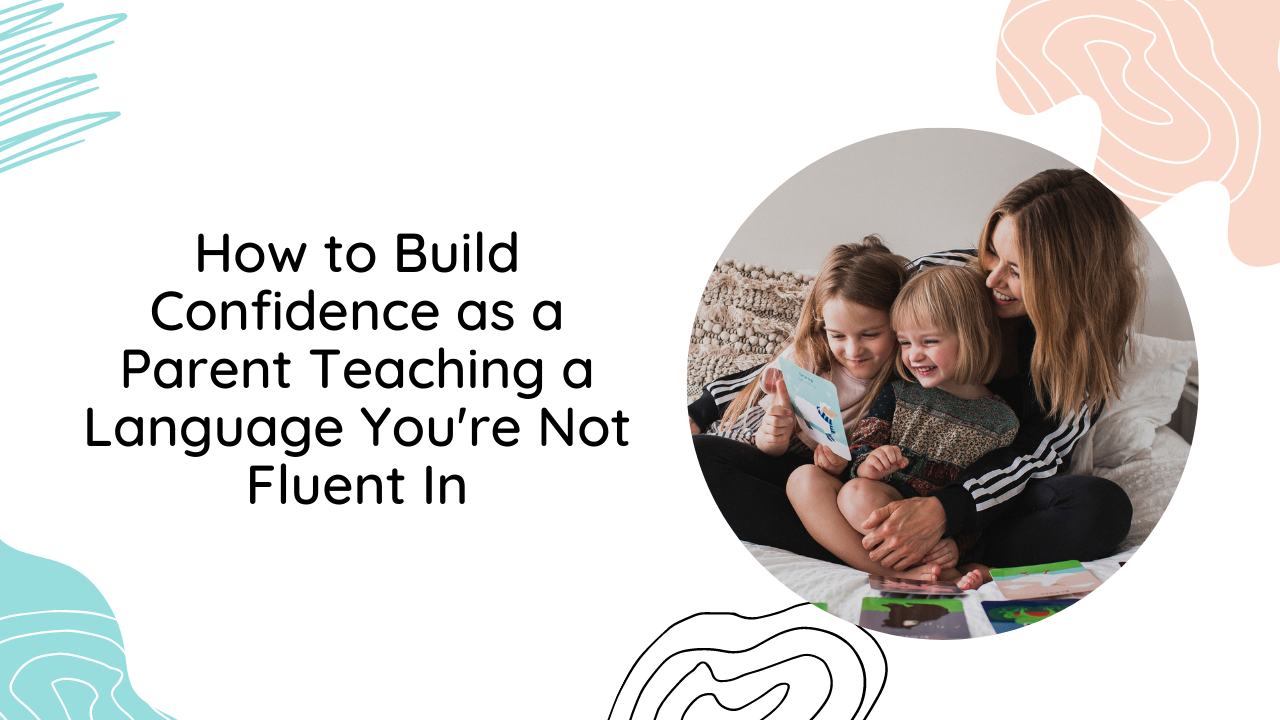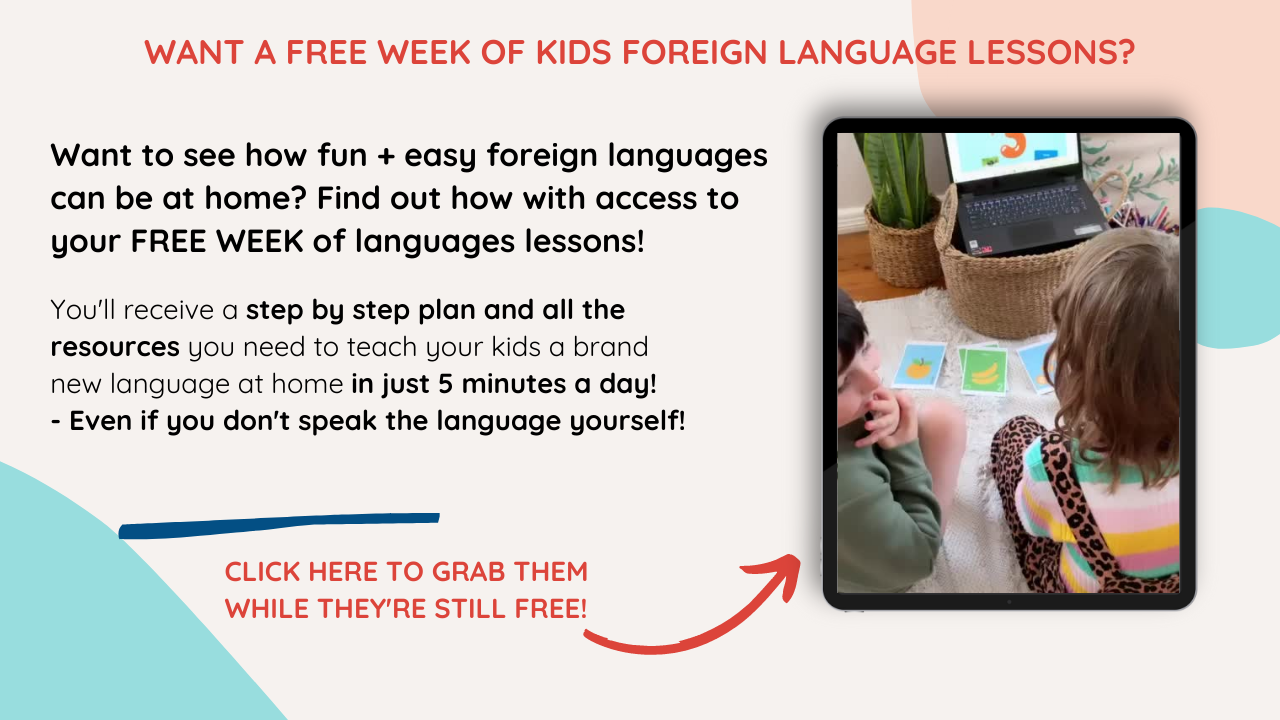How to Build Confidence as a Parent Teaching a Language You're Not Fluent In

How to build confidence as a parent teaching a language you're not fluent in
We all know how difficult the process can be to gain and maintain confidence while growing up and I’m sure very few of us thought that we would have to face that challenge again as adults, but here we are.
You are starting this new journey of teaching your kids a new foreign language at home, a language that you don’t speak a single word of and of course that tends to make you nervous and influence your confidence levels.
Of course you will first have to take some time to figure out which part of this adventure is affecting your confidence.
✅ Is it the part where you don’t speak the language that you have to teach your kids,
✅ or is it perhaps that you feel unsure about your ability to teach your own kids?
Either way, the good news is that regaining your confidence and even growing it is not nearly as difficult as we thought, so let me show you how easy it really is with a few simple tips to get you started.
-
Learn with your kids
So what is the easiest way to regain your confidence when you feel self-conscious about not being able to do something that you really want to be able to do?
Learn how to do it!
But even I have to say that some of these adult targeted courses can be a bit intimidating or overwhelming to start off with, so why not start by learning alongside your kids with their programs?
At the end of the day you will have to learn the exact same content and vocabulary as your kids and in general the courses that are made for your kids are simple and very easy to understand.
Because kids are the main target of these courses, they are designed to be as unintimidating as possible, which is perfect for parents to start with alongside their kids and to build their confidence.
-
Approach it as playtime, not work time
As adults, it is very difficult not to constantly take everything too seriously and we tend to approach everything with a work time mentality, as if we simply have a goal to reach and we need to do it quickly and efficiently.
Teaching and learning a whole new language is not necessarily that straight forward and if you feel that you can’t do it well enough or quickly enough, it tends to chip away at your confidence in your ability to complete the task.
That is why we should look at it from a whole new perspective, not as work or a task to complete, but rather as playtime with your kids, as if it’s a fun activity to do as a family, because that’s exactly what it is!
Once you make that switch in your mind, you will be surprised how much it will raise your confidence levels.
-
Practice by reading some bedtime stories
The beauty of this exercise is that it has a dual purpose. Firstly it gives your kids more exposure to the new foreign language that they are learning in a calm environment where they can focus more on what they hear and get used to hearing the language too.
Secondly, you get to practice the pronunciation of coherent sentences instead of only focusing on individual words and only a few at a time. By doing this, you don’t feel so much pressure to get every single word right with perfect pronunciation, but rather get used to forming coherent sentences without having to think so much about what you want to say before you can get it out.
In our minds it creates the illusion that we are already fluent which really boosts your confidence levels.
-
Play around with pronunciation
So this is your chance to make great progress, build your confidence and even make a game out of it where you can have some fun with your kids while you all are learning this new foreign language together.
If you are very self-conscious about getting the pronunciation right, you can take some time while you are in the shower or in the car on the way to do grocery shopping and play around with the pronunciation.
Make different shapes and sounds with your mouth to get used to the different sounds and tones that may not be common in your native language, which will most likely sound odd to your own ears at first.
Once you get used to something, you tend to be less self-conscious or unsure about it and the same principle applies when you try to pronounce words in a different language.
-
Connect with other parents teaching their kids
One of the biggest reasons why parents who are attempting to teach their kids a foreign language at home for the first time tend to be skeptical about doing it, is the feeling that they are the only ones or the first ones attempting to do it and they have no idea if they can do it or if they can do it right.
Do some research, join some social media groups and try to connect to other parents and families that are on the same adventure as you and your family. They can share their experiences with you, what works, what doesn’t work, how to overcome certain problems or obstacles and just what to expect.
Once you have to talked to some of these other parents, you will see that it really isn’t such a daunting task as you may originally have thought and once you have some answers and clarity about the process, you will definitely feel more confident about your abilities to teach your own kids a foreign language at home.
-
We all make mistakes
Now this is the part where we get to the groundbreaking discoveries. We all make mistakes! Who knew? From a very young age we are all taught to strive for perfection and that we should avoid making mistakes as far as possible, but let’s be honest, avoiding making mistakes is basically impossible and that’s completely OK.
We have to make mistakes in order to learn and that is how we improve. Nobody expects you to be a fantastic teacher to your kids when it’s your first time teaching them and especially not when it’s a foreign language that you don’t speak either.
The goal is to reach a point where you are comfortable with knowing this information and not feeling so pressured to avoid making mistakes. Once you reach this point, it won’t affect your confidence levels anymore and you will be amazed at the feeling of freedom that this will give you.
I’m sure after reading up to this point you will feel a lot less stressed or unsure about teaching your kids a foreign language at home. After you have taken the time to pinpoint the reason for your dipping confidence levels, you now have some tips, tricks and guiding hands to help you overcome those reasons and to boost your confidence levels right back up to an all time high.
So now all that’s left is for you to get started and have some fun while doing it. Remember, this is an adventure and not a task that simply needs to be completed. Now it’s time for you to go get started on your family’s adventure!

✨ Psst... When you're ready, here are a few ways I can help you get started with teaching your kids a foreign language at home...
1. Download my free 10 Page Guide for Parents to help you see how easy introducing a foreign language at home can be - especially if you don't speak the language at all.
2. Want a plan to run consistent language lessons that are fun and easy?
Access your first week of play based foreign language lessons for FREE here, all that's left is to select your language + start today!
3. Looking for a 12 month, step-by-step plan and play based resources to help you introduce a language to your little ones with EASE? Quit scrolling on Pinterest and Join our 12 Month Annual Lesson Bundles to get everything you need to started and KEEP GOING!
GRAB OUR FREE 'KIDS LANGUAGES MADE EASY' GUIDE
FOR NON-NATIVE PARENTS!
Discover how you can run consistent language lessons, that are fun and engaging and help your kids make the progress they deserve!
Even if you're not fluent!
We hate SPAM. We will never sell your information, for any reason.









